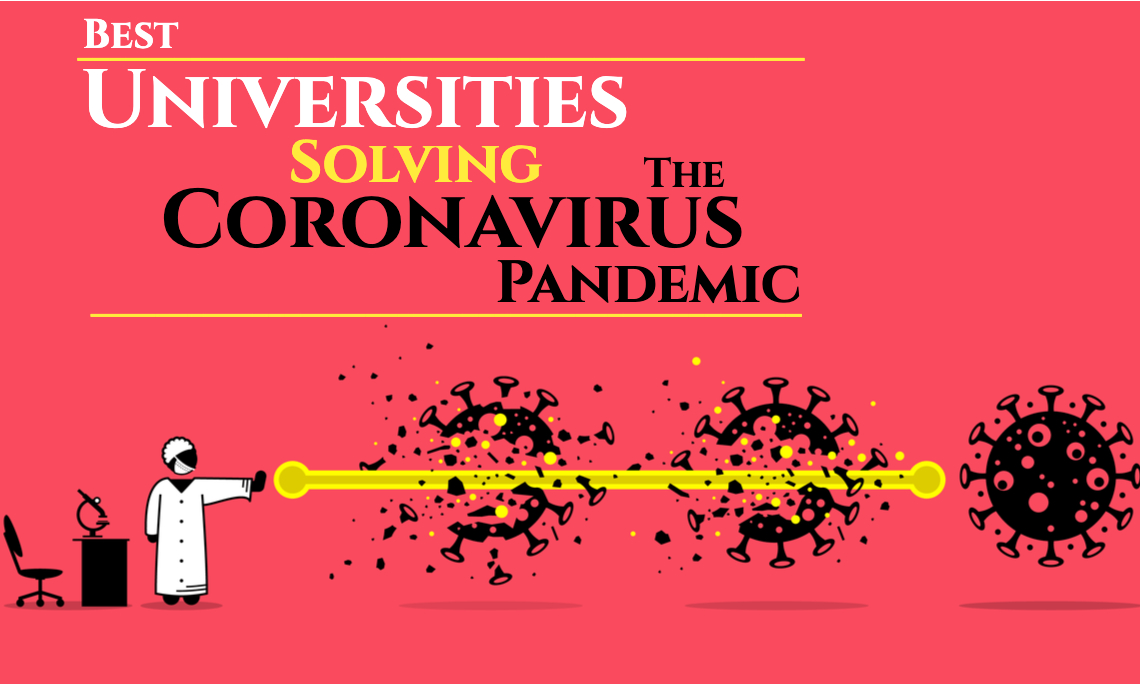| Rank | School | Location |
|---|---|---|
| 1 | Harvard University | Cambridge, Massachusetts |
| 2 | University of Oxford | Oxford, England |
| 3 | Massachusetts Institute of Technology | Cambridge, Massachusetts |
| 4 | Colorado State University, Fort Collins | Fort Collins, CO |
| 5 | Johns Hopkins University | Baltimore, MD |
| 6 | University of Georgia | Athens, GA |
| 7 | University of Michigan, Ann Arbor | Ann Arbor, MI |
| 8 | University of Montana | Missoula, Montana |
| 9 | University of Pittsburgh | Pittsburgh, PA |
| 10 | University of Wisconsin-Madison | Madison, WI |
These 10 universities are contributing to solving the Coronavirus pandemic in various important ways.
Contributions are being made concerning:
- Treatments (vaccines, therapeutics)
- Testing and Diagnostics
- Contagion Mapping
- Contact Tracing
- Data Collection and Analyses
- Education
Certain universities are researching and developing solutions in many of these domains at the same time. All of these areas are important and work together synergistically toward the common goal of defeating the virus and its effects on the world as much as can be achieved.
University: Covid-19 Research
- Harvard University: Vaccines
- University of Oxford: Vaccines
- The Eli & Edythe Broad Institute of MIT and Harvard: Diagnostics, Clinical Testing, Therapeutics, Surveillance, Disease Biology, Data & Portals, Videos and Seminars
- Colorado State University, Fort Collins: 25+ Projects, including Vaccines
- Johns Hopkins University: Interactive Contagion Mapping, Testing Results Numbers, Free Online Contact Tracing Class
- University of Georgia: Vaccines
- University of Michigan, Ann Arbor: Vaccines, Covid-19 Research Index
- University of Montana: Vaccines
- University of Pittsburgh: Vaccines
- University of Wisconsin-Madison: Vaccines

Related:
- The 10 Best Master's Degree Programs in Public Health
- The 15 Best Drug Design Colleges
- The 10 Best Bachelor's in Biomedical Engineering Programs
The Best Universities Solving the Coronavirus Pandemic
Harvard University
Cambridge, Massachusetts
The Harvard Medical School is working with Boston's Children's Hospital to develop a vaccine intended to protect the elderly population in particular from coronavirus disease (COVID-19). The Division of Infectious Diseases at Boston Children's Hospital has a Precision Vaccines Program (PVP), which is working in collaboration with the researchers at Harvard. The PVP works with academia, governmental bodies and industry members internationally to develop vaccines.
The lab, using proprietary patented technology, develops human tissues outside of any living human. It then adds white blood cells from people of different ages to the tissue, and analyzes the results of how these immune systems react by age. It's a way to make age-specific, tailor made vaccines.
Harvard's Center for Virology and Vaccine Research, housed at the Beth Israel Deaconess Medical Center, also develops vaccines. They're working with Johnson & Johnson to develop a vaccine for mass inoculation. Johnson and Johnson plans to manufacture over a billion doses of the vaccine by sometime in 2021.
The first and second parts of the clinical trials in humans will test the vaccine, and a placebo, in two age groups: 18 - 55 years old, and 65+. The trials will be done on 1,045 people from the U.S. and Belgium. If all goes well, the third and final trial phase will begin in September, 2020. This vaccine is being touted as one of the top five contenders from the Trump Administration to work, out of about 125 serious vaccine efforts across the world.
University of Oxford
Oxford, England
The University of Oxford, the oldest university in the English-speaking world, has teamed with biopharmaceutical company AstraZeneca to create and distribute a vaccine for the Coronavirus. AstraZeneca is based in neighboring Cambridge, UK.
The goal is to prevent cases of COVID-19 on a global scale, by administering 2 billion shots per year by 2021. The potential vaccine is known as AZD1222 (ChAdOx1 nCoV-19).
This vaccine is being developed by the Jenner Institute and the Oxford Vaccine Group, both at the University of Oxford. The role that AstraZeneca would play would be to develop, manufacture, and distribute the vaccine worldwide.
The coronavirus is named "corona" because it resembles the spikes on a crown. Corona means crown. The virus uses its spike protein to gain entry into human cells by binding to the ACE2 receptors on our cells. Once inside the cell the coronavirus causes infection.
The vaccination will train the human immune system to attack and destroy any virus that produces the surface spike protein, before entering human cells, and thereby prevent infections. The way it's training the immune system to recognize this spike protein, is by adding genetic material and using a weakened version of another coronavirus, the common cold.
The combination of genetic material that produces the spikes in the SARS-CoV-2, along with the common cold, it is believed will train our immune systems to attack the coronavirus before it ever gets started infecting our cells.
Massachusetts Institute of Technology
The Eli & Edythe Broad Institute of MIT and Harvard
Cambridge, Massachusetts
At The Eli & Edythe Broad Institute of MIT and Harvard, directed by Eric Lander, two labs teamed up to develop a new highly effective diagnostic tool. An application-focused virus lab and a technology development lab are working together to create a platform that would allow for a quick and accurate diagnosis of every virus that causes illness.
The result so far is called: Combinatorial Arrayed Reactions for Multiplexed Evaluation of Nucleic acids (CARMEN).
This technology was successful at providing same day diagnostic results to patient samples. The team is now working on making CARMEN available on a larger scale.
Calvin University alumni Cheri Ackerman, a postdoctoral fellow at the Broad Institute, co-authored a paper in Nature detailing the CARMEN technology.
The Broad Institute's areas of research and available resources for fighting Covid-19:
- Clinical Testing and Processing
- Diagnostic and Therapeutics Research and Development
- Epidemiology and Surveillance
- Data and Portals
- Disease Biology
- Videos and Seminars
Colorado State University, Fort Collins
Fort Collins, CO
At Colorado State University there are over 100 investigators working on more than 25 projects related to Covid-19. These projects include studying the plasma of those recovered from the virus, using individually approved treatments in a cocktail form, and developing a vaccine.
The Department of Microbiology, Immunology and Pathology in particular is playing a key role in vaccine research. Head of the Department, Gregg Dean, is leading a research team using "a genetically modified form of the common probiotic Lactobacillus acidophilus to avert infection".
While Professor Mary Jackson, of the same Department, is leading a research project adapting the Bacillus Calmette-Guerin or BCG vaccine.
The BCG vaccine is widely used in protecting against tuberculosis. First formulated in 1921, doctors have administered over five billion doses of the vaccine to both infants and adults. The initial dose provides approximately 10 years immunity. It is easily produced and transported without refrigeration. The vaccine has been shown to also provide immunity to Staphylococcus aureus and Candida albicans or Yellow Fever virus.
The BCG vaccine is not common in the U.S. due to the low incidences of tuberculosis.
The research team is attempting to pick "pieces of proteins from the virus that are known to elicit an immune response against COVID-19 and trying to have BCG express them at its surface". The hope is that the vaccine would produce neutralizing antibodies. These antibodies would then block Covid-19 from entering the cells.
Johns Hopkins University
Baltimore, MD
Johns Hopkins University's Center for Systems Science and Engineering has created a Coronavirus Dashboard for tracking the COVID-19 pandemic.
This interactive dashboard provides mapping for tracking the spread of the coronavirus at the county level in the US and sub-nationally for many other countries. It also provides numbers of infected, mortality rates and recovery rates. The map shows the world trends of the coronavirus, and a closer look into the trends in the USA in particular. You can see the numbers of cases, deaths and recoveries per state in the US.
There is also a feature to track testing trends per state, which gives daily, weekly, and total number of tests and their positive or negative results. Additionally, there are multiple ongoing data analysis efforts by the team behind the Coronavirus Resource Center which take a deeper dive into testing data, as well as other economic and social drivers of the outbreak case and death data.
Johns Hopkins has also teamed with Coursera and now offers an online class created by the Bloomberg School of Public Health to teach contact-tracing. This free, six hour class is now available, and is taken fully online.
Students learn the history of SARS-CoV-2, how it's transmitted, how to contact-trace, when to quarantine, and other valuable skills. This class doesn't require any prerequisites, and is available to anyone with a high school diploma or equivalent.
University of Georgia
Athens, GA
The College of Veterinary Medicine is heading the vaccine research for Covid-19 at the University of Georgia. The College manages the Center for Vaccines and Immunology. Through this Center, eminent scholars and researchers such as Biao He and Ted M. Ross lead teams in developing vaccine candidates.
One research group, who was already in the process of developing a vaccine for MERS-CoV, easily transitioned to focusing on SARS-CoV-2. The group is using the MERS vaccine research as a starting point for the Covid-19 vaccine research. Currently, the vaccine is working off of a viral delivery platform. The vaccine would use a modified version of the virus that causes kennel cough in dogs, parainfluenza virus 5 (PIV5).
The team is using this modified version of PIV5 'due to its safety in humans'. Dog owners especially have been safely exposed to PIV5 if their dogs have been immunized.
The modified PIV5 virus produces proteins also found in corona viruses. The hope is that by exposing the body to the proteins in PIV5, the body can easily mount a defense against the MERS spike proteins produced by the modified virus.
Researchers are hopeful that the vaccine will be approved by the FDA by the end of the year.
University of Michigan, Ann Arbor
Ann Arbor, MI
Vaccines, Covid-19 Research Index
The University of Michigan has organized Covid-19 research across multiple disciplines.
The university has collected information regarding various research projects into the Covid-19 Research Index.
Students and professors strive to include all ongoing projects (in various states of completeness). The projects range in scope from basic laboratory research unrelated to therapeutics to stress and mental health during Covid-19. Some sample projects include:
- SARS-CoV-2 Sequencing
- Vaccination against COVID-19
- USA Pediatric COVID-19 Registry
- Healthcare Workforce Capacity
- Assessing PPE recycling approaches
- Social Wellbeing during COVID-19
- Public Policy Analysis and Impact
Additional information can be found at the Research Home Page. Here professionals find further resources regarding:
- Research Re-Engagement - How to return to research while following state guidelines
- Covid-19 Funding Opportunities
- Covid-19 Research Publications
- Covid-19 Research News
University of Montana
Missoula, Montana
Vaccines
Jay Evans is the director of the Center for Translational Medicine at the University of Montana (UM). His interdisciplinary research team consists of professors from a variety of departments. The team is working on the discovery and development of novel vaccine adjuvants and delivery systems. Adjuvants are 'chemicals that help vaccines work more effectively and safely'. The 45 member team has NIH funded projects working on vaccines or treatments for influenza, whooping cough, pseudomonas, tuberculosis, Lyme disease, and opioid addiction.
This experience positioned Evans' team to be at the forefront of research for the Covid-19 pandemic.
In February, Evans' team was contacted by the National Institutes of Health (NIH) to start research on a SARS-CoV-2 vaccine. To help with research expenditures, the NIH granted $2.5 million dollars to UM to accelerate discovery and development of a COVID-19 vaccine candidate.
The team is working in partnership with Dr. Florian Krammer and Dr. Adolfo Garcia-Sastre from the Icahn School of Medicine at Mount Sinai in New York City.
University of Pittsburgh
Pittsburgh, PA
On April 2nd, 2020, the EBioMedicine magazine published a paper on the Pittsburgh Coronavirus Vaccine (PittCoVacc) which is being developed by the University of Pittsburgh, School of Medicine, and its clinical partner UPMC.
The research team has seen success with PittCoVacc in clinical trials on mice, whose immune system produced "antibodies specific to SARS-CoV-2 at quantities thought to be sufficient for neutralizing the virus."
PittCoVacc involves a new injection method called a micro-needle array, which is a small Band-Aid-like patch that is applied directly to the skin. The patch contains 400 tiny needles made of sugar and protein pieces that dissolve into the skin where the immune system response is the strongest. The production of the micro-needle array patches is easy to scale up to mass quantities. The patches do not require refrigeration and can be stored at room temperature until needed.
Researchers are now applying for approval from the FDA to move into the first phase of human clinical trials.
The National Institute of Allergy and Infectious Diseases, National Institute of Arthritis and Musculoskeletal and Skin Diseases, and the National Cancer Institute provided funding for this research.
University of Wisconsin-Madison
Madison, WI
The University of Wisconsin-Madison has partnered with FluGen and Bharat Biotech, two vaccine companies. The vaccine in progress is called CoroFlu.
The basis for the CoroFlu vaccine is a flu vaccine candidate named M2SR. Virologists Yoshihiro Kawaoka and Gabriele Neumann developed M2SR as a 'self-limiting version of the influenza virus'. The research team plans to insert the gene sequence from Covid-19 into the M2SR vaccine. The hope is that this will induce immunity to Covid-19.
By itself, the M2SR vaccine has shown to be safe and well tolerated in several clinical trials involving hundreds of subjects. It lacks the M2 gene of the flu virus 'which restricts the virus to undergoing only a single round of replication in cells'.
This means that the flu virus can enter cells but not leave, triggering an immune response. But since the virus cannot leave the cell to duplicate the host does not get sick.
The vaccine will be administered intra-nasally, mimicking the natural infection route.
UW-Madison's Influenza Research Institute will host the animal model trials of the CoroFlu vaccine. The Institute is a designated Biosafety Level 3 Agriculture facility. Initial animal trials are expected to take three to six months.

